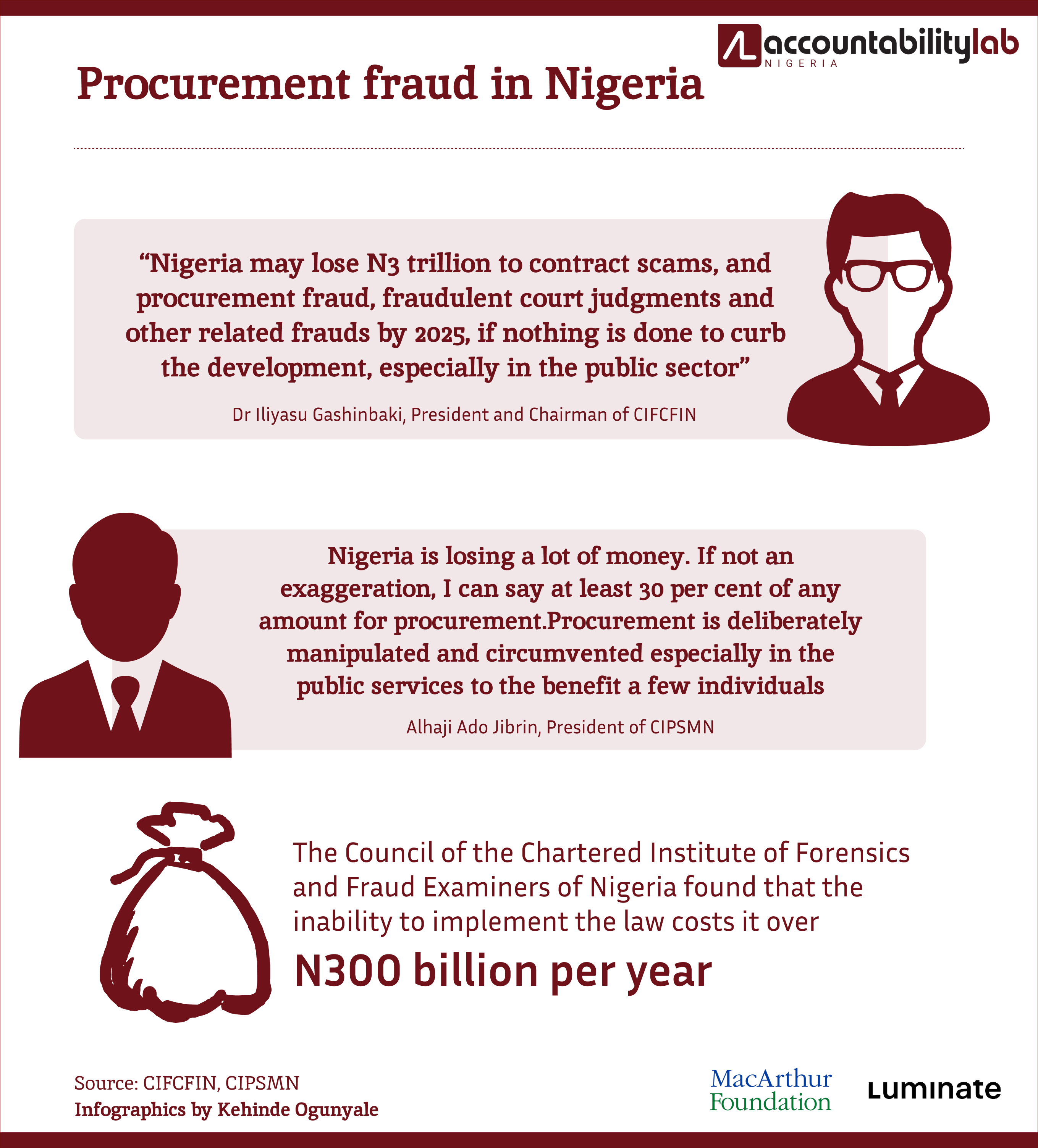NEWS
August 15, 2024

IN BRIEF
Disturbed by the volume of money Nigeria is losing to procurement-related frauds, stakeholders in the sector have called for action against the menace to prevent the country from losing a projected sum of N3 trillion to contract scams and procurement fraud by 2025. Recently the Economic and Financial Crimes Commission (EFCC) commenced the prosecution of a former governor of the Central Bank of Nigeria (CBN), Godwin Emefiele, on an alleged procurement fraud. The Chartered Institute of Forensics and Certified Fraud [...]
SHARE
Disturbed by the volume of money Nigeria is losing to procurement-related frauds, stakeholders in the sector have called for action against the menace to prevent the country from losing a projected sum of N3 trillion to contract scams and procurement fraud by 2025.
Recently the Economic and Financial Crimes Commission (EFCC) commenced the prosecution of a former governor of the Central Bank of Nigeria (CBN), Godwin Emefiele, on an alleged procurement fraud.
The Chartered Institute of Forensics and Certified Fraud Investigators of Nigeria (CIFCFIN) last year warned that Nigeria may lose N3 trillion to contract scams, and procurement fraud if nothing is done to curb the development, especially in the public sector.
President and Chairman of the institute’s governing council, Dr Iliyasu Gashinbaki who gave the hint at the 2023 International Fraud Awareness Week, warned that something concrete must be done to stop the fraud that he said was causing the federal, state and local governments an annual cumulative loss of about N1.4 trillion based on credible intelligence.
Also, the Chartered Institute of Purchasing and Supply Management of Nigeria (CIPSMN) had earlier pointed out that the manipulation of the public procurement process was causing the country to lose 30% of its resources. This trend, the institution said, can be reversed by the Federal Government constituting the National Council on Public Procurement, which will come up with policies in line with international best practices.
The National Council on Public Procurement is to function as a regulatory authority responsible for the monitoring and oversight of public procurement, harmonising the existing government policies and practices by regulating, setting standards and developing the legal framework for public procurement in the country.
The CIPSMN President, Alhaji Ado Jibrin, who made this call at the institute’s annual conference, said public procurement is deliberately manipulated, especially in public services, in order to benefit a few individuals.
He said: “Nigeria is losing a lot of money. If not an exaggeration, I can say at least 30% of any amount for procurement.”
“Procurement is deliberately manipulated and circumvented, especially in the public sector, to the benefit of a few individuals’’.
“There is no denying that some people are hell-bent on annihilating the purchasing/ procurement profession and professionalism in order to continue with the mess.”
A few years after
The development confirms what then Nigeria’s Vice-President Yemi Osinbajo, who accused previous administrations of stealing some $15 billion (13 billion euros) of public money through fraudulent arms deals, pointed out.
According to Osinbajo, the huge sum was “lost to fraudulent and corrupt practices in security equipment spending during Goodluck Ebele Jonathan’s administration’’.
“The figure is more than half of Nigeria’s current foreign exchange reserves of $27 billion,” he said in a speech in the southwestern city of Ibadan in 2016.
To curb the menace, a due process officer at the Gombe State Government House- an Integrity Icon nominee of the Accountability Lab Nigeria, Haruna Gildado Yidi, has called for strict compliance with the laid down rules and regulations. This is in line with calls from stakeholders for the government to inaugurate the National Council on Public Procurement.
Yidi insisted that due process must be followed in the purchase of goods and services from the initial stage to the completion of the process to curb procurement fraud in the public sector.
He said: “I think the best way to safeguard the sector is to strictly follow the laid down rules and regulations concerning the procurement of goods and services in all the procurement processes, from the initial to the completion of the process.”
Yidi called on civil society organisations (CSOs) to push harder to ensure accountability in the public sector while narrating how he was offered a bribe by a contractor to do the wrong thing but rejected.
Maintaining accountability is key Yidi stated, “We must maintain accountability in our work by ensuring that it is carried out according to specification without favouring any party. If a contractor insists on doing the wrong thing, we are the ones to call them to order.”
He added that organisations like Accountability Lab Nigeria and others must push for integrity in public procurement “because it is a good idea to get citizens to do the right thing at the right time’’.
This report is championed by Accountability Lab Nigeria and sponsored by The John D. and Catherine D. MacArthur Foundation and Luminate
